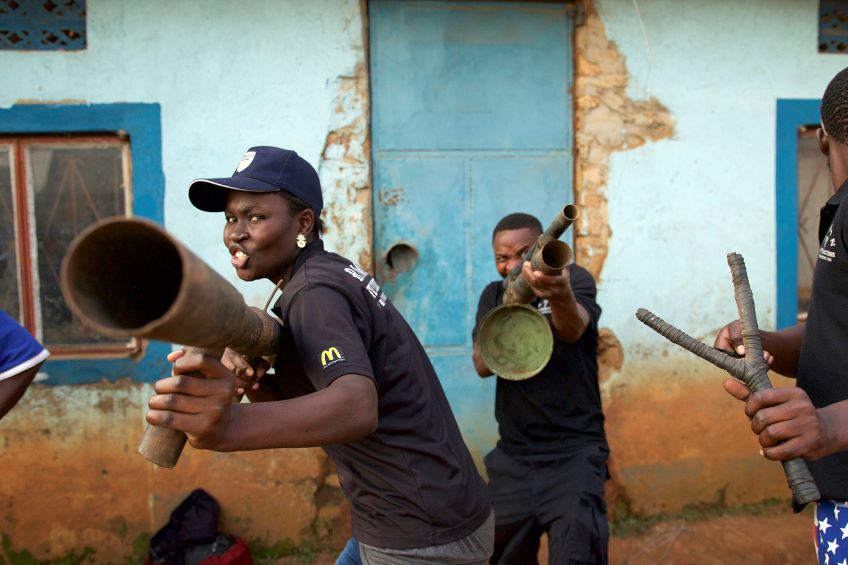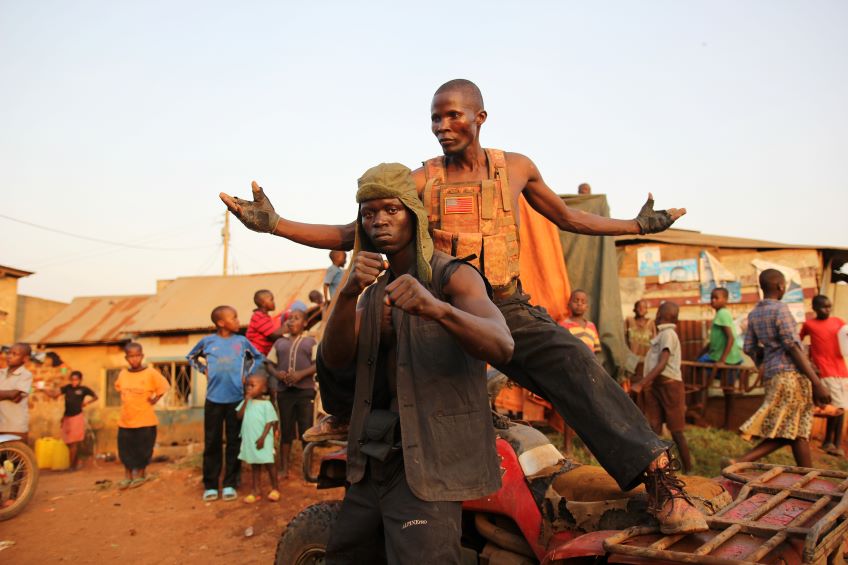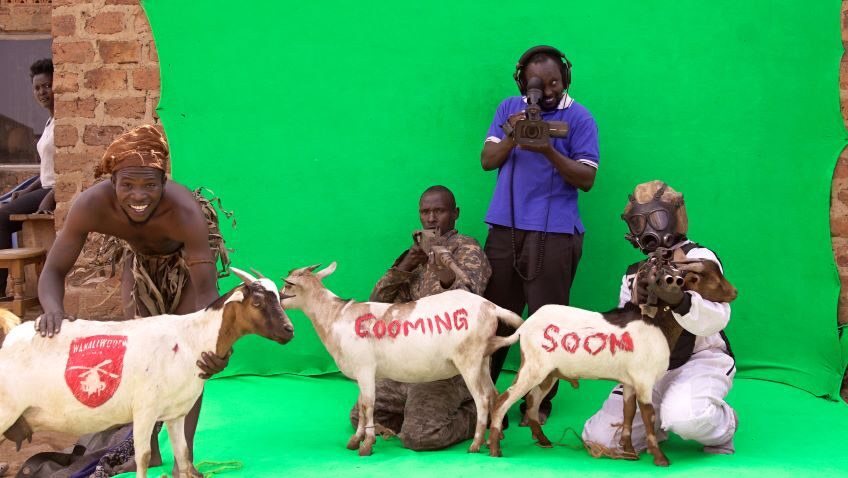Joyce Glasser reviews Once Upon a Time in Uganda (September 5, 2023) Cert 15, 93 mins.
Five miles, nine years of age and a college education separate singer, composer, actor, and presidential candidate Bobi Wine and Isaac Nabwana, the talented entrepreneurial filmmaker behind Uganda’s only film studio for action movies. By a happy turn of fate, both Christopher Sharp and Moses Bwayo’s Bobi Wine: The People’s President and Cathryne Czubek’s Once Upon a Time in Uganda, are released this week, and what an engrossing, eye-opening double bill they make.
Both Bobi and Isaac were born in the suburban slums, or shanty towns, of Kampala under the shadow of Idi Amin. Both appeal to the “peasants” as Isaac calls his audience: Bobi, through his public service and protest songs, and Isaac through his violent action comedies designed to give the downtrodden something to laugh about.
Both are marked by the violent, unstable dictatorship of Yoweri Museveni who seized power in 1986. That said, while Wine’s mission is to re-establish democracy in Uganda, Isaac remains apolitical and eventually lands a contract with Ugandan television. Another big difference is that while Wine lives in a large, comfortable, gated house, and earns his income from outside of Uganda as well, Nabwana’s ramshackle studio is his home in the cesspool of Wakaliga, which he wants to put on the map as Wakaliwood.

The first Ugandan voice we hear, is VJ (video joker) Emmie, telling us with appropriate visuals and a considerable amount of irony: ‘This is Uganda, the pearl of Africa; this is Kampala, a capital city; and this is Rubaga Cathedral. We blew it up – in a movie.’
There are a few things viewers need to know about Ugandan cinema as defined by Ramon Film Productions in Wakaliwood. The VJ is a joke-cracking narrator to these films of limited dialogue. VJ Emmie injects humour into the cartoon violence, and even into the horror films. Isaac grew up hearing about the films of Bud Spencer, Chuck Norris, Bruce Lee and Stallone’s Rambo from his older brother who went to the movies and returned to entertain Isaac with their stories.
Isaac always wanted to be a filmmaker, but, unable to afford school fees, he became a bricklayer and made enough bricks to buy his first camera. When he married Harriet, now a hardworking, practical and entrepreneurial mother of three, he told her he would pursue his dream, and asked for her support. She’s never failed him.
Another thing you need to know about the completely self-taught Isaac is that, in his impossibly cluttered studio, which is one room off his house, he designs and executes all the special effects mainly using toy models, like young Steven Spielberg in The Fabelmans. He builds his own computers and any equipment they don’t have; welds guns, and is creative about acquiring props, wigs, and costumes. His biggest problem is the dirt and dust, flash floods and frequent electricity cuts.
And one more thing: his cast and crew are volunteers. Isaac does give back to the community by training the cohabitants of Wakaliga in make-up, lighting, editing and acting. When Isaac begins teaching the neighbouring children martial arts, he discovers a market for children’s films. Crazy World becomes an instant hit.

There’s no money in the industry to pay, but Harriet provides catering, and by the end of the film she goes into business baking speciality cakes, after watching a programme on You Tube. Like Bobi Wine and his wife, Barbara Kyagulany, Isaac and Harriet are a match made in heaven.
To create awareness, Ramon Productions started giving away trailers on DVDs, and soon started selling DVD’s of the films. But not many families in Uganda can afford a DVD player, so Isaac supports his family by filming weddings and commercials.
Isaac tells us that the rich Ugandans have no confidence in the peasant class and will not invest in his studio. While one might think the challenge is racism from the outside world, the huge gap between the rich and the poor – exacerbated by Amin and Museveni – is his main problem.
When Isaac starts writing the script for Bad Black, based on a true story about a white man robbed by a black man, he has a problem. To make the film work, he needs a Muzungu, or white man. No make-up. But where would he ever find one?
Enter Alan Hofmanis, a 42-year-old New Yorker with experience in the film industry, who is taking stock of life. His girlfriend has ditched him before trying on the wedding ring he bought; he’s not making money and is drifting. He needs to reconnect with the joy and creativity that once fuelled his love of cinema.
It was December 2012 – a precious date as the time frame in the film is not always clear – and a friend had just sent him the trailer for Who Killed Captain Alex. Alan makes an impetuous decision to go to Kampala and track down Isaac, who couldn’t believe his luck. With Bad Black, Alan, now called Ssali, becomes the first Muzungu in Ugandan cinema. Even more violent ends await this Muzungu, who, in another film, is eaten alive by cannibals, the recipe for a surefire hit.
If the Muzungu lacks Kung Fu skills he makes up for this shortcoming with his international marketing. Convinced that Isaac will only get attention inside Uganda after becoming known internationally, Alan begins a campaign that brings results. And sure enough, Robert Kabushenga, the most powerful man in Ugandan media, commissions Isaac to adapt his film, Who Killed Captain Alex as a TV series.
This success puts Ramon Productions on the map, but the enterprise only breaks even. Feeling alienated, and fearing that Isaac has lost his direction, Alan returns to New York. Out of sight, but not out of mind, Alan starts to work on a new marketing strategy to put Isaac on the film festival circuit.
If Alan is getting flack for “promoting violent films about Africa, ”Isaac, too, is aware that the violence in his films is a kind of parody of the violence of Ugandan politics. At one point, during an uprising which Museveni’s militia quashes with violence, Isaac fears that his actors, dressed in military uniforms with fake weapons, will be attacked or arrested. ‘I haven’t made a movie yet about the kind of violence I witnessed,’ Isaac acknowledges. ‘Someday, I will.’




